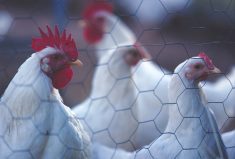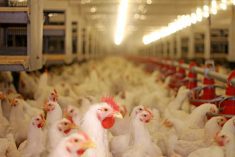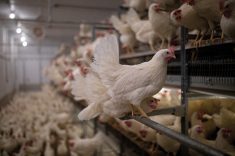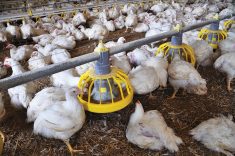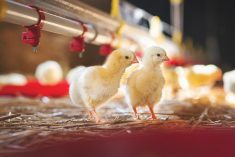A spokesman for Manitoba Chicken Producers hopes a meeting November 1 sets the record straight on how its new annual specialty quota program set to launch in 2017 will operate.
MCP executive director Wayne Hiltz will speak in Winnipeg that day to a producer meeting organized by Direct Farm Manitoba.
Hiltz said he can address concerns the group has raised, which are based on misinterpretations of how the program will operate.
“The concerns that we’ve heard to date, in some cases, were false concerns,” he said, adding that the main thing he wants cleared up is the assertion that the program will somehow force producers now doing specialty chicken to roll back production.
Read Also

Province pledges funds to CentrePort Canada
The Manitoba government has pledged $450,000 towards projects at inland port CentrePort Canada.
“We are not reducing anyone’s ability to produce chicken,” said Hiltz.
“Those who have been doing permits in the past, who are at higher levels than what the program is for people coming in, are being given every opportunity to continue producing at that level.”
MCP announced in September it is introducing an Annual Specialty Quota Program. It says its intent is to offer new farm entrants an opportunity to become designated producers and service expanding specialty chicken markets, including those for special breeds, weights, production methods and raised in accordance with specific religious groups’ specifications.
Other provinces have introduced similar programs to meet growing local demand by consumers for a more diverse range and choice of fresh chicken.
The newly organized Direct Farm Manitoba group says it’s worried about the impact this will have on those already doing so under exemption permits. On December 31 MCP is ending its Special Market Development and Servicing Policy, under which it granted those exemptions.
Its other complaint is that an annual allocation as this program will offer will make it difficult for new entrants to secure financing to participate.
Hiltz said producers operating under the old system also secured permits on a yearly basis.
“We have approximately 27 or 28 producers, who on an annual basis applied to the board for a permit to grow a specific type of chicken. But that was always year to year. There was no long-term business plan. There was no quota assigned to it. It was an ad hoc program that decisions were made on every year.”
What MCP is pursuing now is a longer-term program to replace that ad hoc approach, he said. Designated producers under the Annual Specialty Quota Program will have submitted business plans to MCP about the type of production they’re doing, then only need to update the board in subsequent years for reapproval, he said.
“The framing that this is somehow less structured is inaccurate,” he said.
Phil Veldhuis, chair of DFM said when they met with Hiltz last week to go over their concerns, the discussions did shed more light on the program.
“They (MCP) did also indicate, to some of our other concerns, that it was their plan to be flexible and supportive of applicants into this program. I’ve suggested that we should make sure people know that,” he said, adding that’s the point of the November 1 meeting.
“The point of this meeting is to make sure they know exactly how this program works, exactly what the opportunities are, and hear it from the horse’s mouth,” he said.
The application deadline to participate in 2017 is also looming. Applications must be submitted to MCP by November 18.
The meeting will be held at 10 a.m. at the St. Norbert Community Centre located at 3450 Pembina Hwy.




